| Srl | Item |
| 1 |
ID:
131784
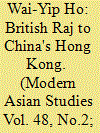

|
|
|
|
|
| Publication |
2014.
|
| Summary/Abstract |
The madrasa, the Islamic institution of learning, has for centuries occupied a central role in the transmission of religious knowledge and the shaping of the identity of the global Muslim community (umma). This paper explores the sharp rise in the number of madrasas in contemporary Hong Kong. It examines, in particular, how South Asian Muslim youth, after receiving a modern education in a conventional day school, remain faithful to their religious tradition by spending their evenings at a madrasa studying and memorizing the Qur'an. Engaging with the stereotypical bias of Islamophobia and national security concerns regarding the ties of madrasas to Islamic terrorist movements over the last decade, this paper argues that the burgeoning South Asian madrasa networks have to be understood in the context of Hong Kong's tripartite Islamic traditions-South Asian Muslim, Chinese Hui Muslims, and Indonesian Muslims-and within each Muslim community's unique expression of Islamic piety. Furthermore, the paper also identifies factors contributing to the increase in madrasas in Hong Kong after the transition from British colonial rule to China's resumption of sovereign power in 1997.
|
|
|
|
|
|
|
|
|
|
|
|
|
|
|
|
| 2 |
ID:
144618
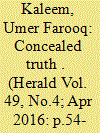

|
|
|
| 3 |
ID:
106676
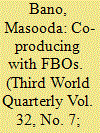

|
|
|
|
|
| Publication |
2011.
|
| Summary/Abstract |
Forging partnerships for development is one of the eight Millennium Development Goals. While faith-based organisations (fbos) are receiving growing attention within development policy as important non-state service providers, they are assumed to be less conducive to forging partnerships with governments or development organisations than secular ngos due to their allegiance to specific religious beliefs. Analysing the dynamic of engagement between the state and madrasas (the most prominent fbo in the Muslim world) in six countries across two geographical regions-the Middle East (Egypt, Syria, Turkey), and South Asia (Pakistan, India, Bangladesh)- the paper counters the assumption that fbos are less likely to enter into negotiations, demonstrate flexibility, and engage in the strategic bargaining often involved in forging such partnerships. Like ngos, fbos respond to socio-political and economic incentives and enter into a variety of relationships with the state, ranging from co-operation to conflict. The defining feature in building a cooperative relationship is the level of trust between the negotiators on the two sides.
|
|
|
|
|
|
|
|
|
|
|
|
|
|
|
|
| 4 |
ID:
164881
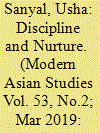

|
|
|
|
|
| Summary/Abstract |
This article presents an ethnography of a contemporary residential madrasa for teenage Muslim girls in a North Indian town undertaken by a team of two researchers. We focused on different aspects of the overall study, with Sanyal conducting participant observation within the madrasa and Farah interviewing a select number of graduates and former students in their home environments. The result is a comprehensive picture of the madrasa's transformative role in the socio-religious lives of its students, which highlights the importance of the connections between the madrasa and the home.
Of significance are the religious and denominational orientation of the madrasa—Barelwi Sunni Muslim—as well as the working-class status of the girls and their parents’ low level of education. With limited resources, the madrasa inculcates in the students, and by extension their neighbourhoods and wider communities, a new awareness of religious duties and mutual obligations, and gives its students confidence and a voice within both their families and communities. The long-term potential impact of madrasas such as this one appears to be significant in contemporary North India.
|
|
|
|
|
|
|
|
|
|
|
|
|
|
|
|
| 5 |
ID:
111782
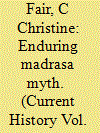

|
|
|
|
|
| Publication |
2012.
|
| Summary/Abstract |
"[W]idespread acceptance of the purported ties between Islamic schools and militancy in Pakistan relies on a number of empirically flawed assumptions and assertions…."
|
|
|
|
|
|
|
|
|
|
|
|
|
|
|
|
| 6 |
ID:
101348
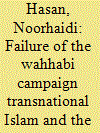

|
|
|
|
|
| Publication |
2010.
|
| Summary/Abstract |
The Salafi madrasa has evolved in Indonesia as a consequence of Saudi Arabia's immensely ambitious global campaign for the Wahhabization of the Muslim umma. Demonstrating the importance of transnational networks in shaping the current dynamics of Indonesian Islam, the madrasa appears to be the centre of excellence for the Salafi protagonists to spread Saudi-style Wahhabi Islam among Indonesian Muslims at the grass-roots level. Its curriculum places an emphasis on the teaching of tawhid, or more precisely, Wahhabite doctrine. Meaning to accept and believe in the oneness of God and His absolute authority, tawhid is considered by the Salafis to be the pillar of the Muslim creed, whereby a superior moral order is established at the level of the individual, the family or the community. Because of its exclusive style and old-fashioned structure, it has attracted only a few abangan children, and thus has not brought about significant change. There is scepticism about the relentless effort of the Salafi teachers to recruit young villagers into their circles and introduce what they claim to be authentic Islam while criticizing local religious practices. Nonetheless, the impact of the madrasa has gone beyond the sphere of education. It has provided alternative access to education for underprivileged rural children and the downtrodden young and has offered a universal alternative model of truth and social action. Attempts to adjust the madrasa profile to the local context and national demands have been made by some Salafi protagonists in response to the geostrategic shifts and as a result of growing suspicion since 9/11 of the existence of the madrasa as a major training ground for terrorists.
|
|
|
|
|
|
|
|
|
|
|
|
|
|
|
|
| 7 |
ID:
153020
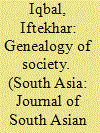

|
|
|
|
|
| Summary/Abstract |
This paper explores the anxious and sometimes hostile relationship between modern forms of civil society and non-modern institutions in Bangladesh. I argue that an uneasy relationship arises from civil society's inability or lack of initiative to identify and negotiate with ‘pre-modern’ social institutions and their remnants, which I conceptualise here as samaj. Such dissonance and disengagement have been historically constructed largely with regard to the way in which the roles of the state, capital and market forces have been conceptualised at the interface between ‘modernity’ and ‘tradition’. This proposition demands a genealogical understanding of the relationship between civil society and samaj, in which the latter is represented by religious institutions such as the khanqah and the madrasa.
|
|
|
|
|
|
|
|
|
|
|
|
|
|
|
|
| 8 |
ID:
021302
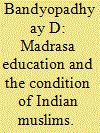

|
|
|
|
|
| Publication |
April 20, 2002.
|
| Description |
1481-1484
|
|
|
|
|
|
|
|
|
|
|
|
|
|
|
|
| 9 |
ID:
092247
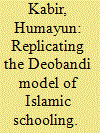

|
|
|
|
|
| Publication |
2009.
|
| Summary/Abstract |
The proliferation of the Deobandi model of religious school has been taken for granted in South Asia, although how its pedagogic method and theological stances are being replicated in Bangladesh has received little academic attention. This paper delves into the replication of the Deobandi model of religious schooling in Bangladesh by describing the replication process in a local Quomi madrasa, which received strong patronage from Deoband at the height of the Islamic revivalist-reformist movements in South Asia. This study reveals that localized versions of Deobandi madrasas in Bangladesh are concerned with the 'other' Muslims, that is, Muslims with doctrinal views differing from the Deobandi school of thought. The contestation between the Deobandi interpretation of Islam and the other interpretive Islamic groups within the circle of madrasas suggests that Muslim identity is a matter of contention, with differing points of view from one type of madrasa to another and from one group of ulama to another.
|
|
|
|
|
|
|
|
|
|
|
|
|
|
|
|